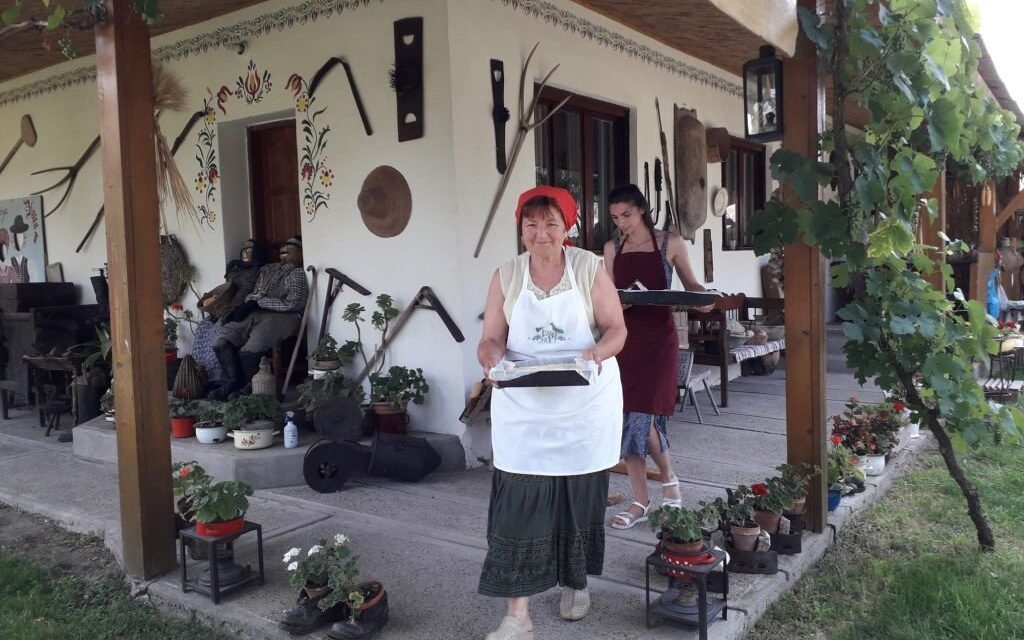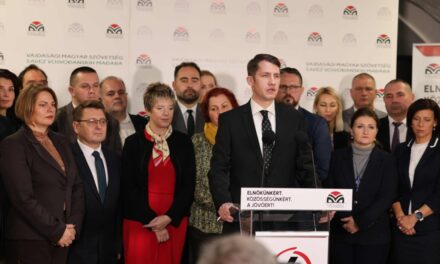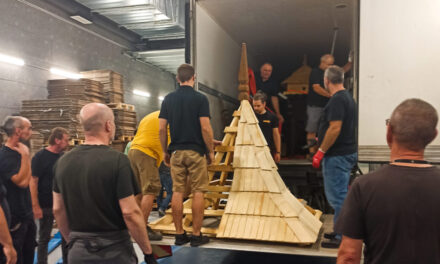The Tornyai Tájház is a fresh spot reminiscent of Hungarian peasant life in the Great Plains of old in Arad county, but perhaps on the entire border of Partium and Bánság. At the beginning of their retirement years, András Suttyák and Piroska Tóth found their new vocation: preserving traditions, community organization, and introducing young people to folk crafts.
They present what they learned from their parents and how they lived as children, so they are authentic in what they do. Tornyai Tájház is a living museum, the couple lives there from spring to late autumn, and anyone is welcome to visit the island of folk culture.
Tornya is one of the western gates of the country, as it has a permanent border crossing to neighboring Battonya in Hungary. The settlement is located less than twenty kilometers from Arad, the first written mention of which is known from a 1333 papal tithe list. In the Middle Ages, it was depopulated due to the Turkish and then Tatar invasions, but in the 18th century it became the property of Lőrincz Marczibányi, and he settled Hungarian, Slovak and Swabian serfs alongside the Serbian and Romanian families who infiltrated from the south.
In the year of the Millennium, 1896, according to legend, the Virgin Mary appeared to a goose shepherd girl named Erzsike Dusik on the border of the village, and in that place a spring arose, the water of which is considered by many to have a healing effect. Believers make pilgrimages there from far away, so a small Marian chapel was also built at the place of the apparitions (there are eight in total). In the middle of the 20th century, Tornya was an educational center: it had an eight-grade boarding school with Romanian, Hungarian and Serbian sections - today Hungarian education is only a memory, and even Romanian is only taught at elementary level.
The settlement bears all the signs of a scattered existence: the change of power after Trianon, the administrative reorganization in 1968, when it was stripped of its administrative status and annexed to Pécská, the forced industrialization of socialism all contributed to the assimilation or emigration of Hungarians, as a result of which the community was reduced to a handful and aged .
"Once there were only Hungarians in Tornya, few Romanians, Serbs... and everyone spoke Hungarian. It really didn't matter who or what nationality they were, we attended the Romanian and Serbian church farewell, and they also came to ours. Now you rarely hear the word Hungarian on the street"
- compared the past and the present Piroska Tóth, president of Tornyai Tájház and the Pro-Pir-Kult Association, which operates as its background institution.
"A country house should have a country house, but this is not it. This is a lowland country house, and we thought that until we find or build a traditional thatched farmhouse, we will store the old tools here. It has not been realized since then, but in the meantime the collection has expanded to several thousand pieces, and the word of this house has spread in the area" -
recalled the beginnings of András Suttyák, i.e. Uncle Bandi, Little Red Riding Hood's partner.
The porta on the banks of the Szárazér was not called a country house out of modesty - it was "stuck" by the common language - and definitely not a museum, since the objects here can not only be viewed, but also tried: the old tools, the tools used for farming in the backyard work one by one, and what they receive in an inoperable state, Uncle Bandi fixes it like a handyman.
They started building the collection in 2005, in the first five years they received objects from Tornya, but since then they have also received objects from Nagyvarjas, Szederhát, Arad, Hungary and Vojvodina. "There is a wood-burning pig roaster, a grain grater, a corn grater, a hundred-year-old cradle, a shepherd's staff, but there are also things that are not typical of the lowlands, especially not of Tornya, and there are even objects known from civil society. We do not refuse anything that is given with a good heart, and when the donor comes back, he can say that we have found a place for everything , explained András Suttyák.
Sometimes we come home and find this and that thrown at the gate. Young people from many families bring what was left after the grandparents during garbage disposal. They are happy to find a home for these items, and often regret throwing something away or burning it. By the way, all donations are entered in the guestbook. Maybe we caught the last train with this collection to save these things…”
"Two years later, we registered the Pro-Pir-Kult Association, because we needed an organization that would provide the legal background by which we could make the collection known, so that we could not continue the work just for our own pleasure - Piroska Tóth took the floor. – First, it was a color that we covered with reeds to protect the existing agricultural tools, the plow, hoe, and harrow from the elements. Then we grew, and now we have a country house, which is populated not only by objects, but also by visitors". The thatched roof can still be seen today, and its memory has even been written down, because in 2017, on the tenth anniversary of the foundation of the NGO, the small monograph entitled From the Reed Cone to the Landscape House was published. The small, round, thatched roof now functions as a poultry house, as fowls flock to a backyard farm, and next to them, two sheep cheer up the visitors even better, and until a better creation came up, a black puli surrounded the arriving guests.
Because there is never a shortage of visitors: kindergarteners and schoolchildren come in organized groups from Pécska, Arad, but also from other settlements in the county. The country house has appeared several times on Hungarian and Romanian public television, various activities have been held in the courtyard, and Romanian folk musicians have filmed video clips in the folk environment on several occasions. Together with the Arad County Hungarian Farmers' Association, they hold plum days every autumn, and in addition, Aunt Piroska organizes homemade soap making and tarhony making - when and what is in season - but on their initiative, they have also held groomsmen's and country house meetings, and they also organize Peasants' Olympics if someone asks.
"We can only preserve and pass on our traditions if we practice them. We didn't invent these, but we learned a lot from the association of Hungarian landscape houses. I hope that this initiative takes root, because if we don't do something, our traditions will die out, and so will we. We also need an association of country houses, so that we can discuss things with each other and learn from each other. When I was a child, I also wove, knitted, and did needlework, and I am happy to pass on what I know.
It is important for children to do handicrafts so that they not only press the tablet with one or two fingers, but also use their brains and hands, because they can make a lot of things with a little dexterity."
Aunt Piroska revealed her confession of faith.
In recent years, Piroska Tóth and András Suttyák have thought several times about "slowing down the pace", but there are so many requests and invitations that they cannot say no. On the first of June, they also represented Arad county in Szarvas, at the Csülök, Körömsütő and -Fző Festival, where they won first prize in the other category with "Neni Piri's bean goulash with knuckles", in addition, they also received the special award of the Ambassador of Hungarian Gastronomy as the team that participated the most, because the according to the organizers, they raised the standard of every event with their presence and authentic stand. "Our spirit shines at this time, and it gives us the strength to continue," they say every time.
A name plate carved above the gate of Tornyai Tájház welcomes the guest upon entering the courtyard, and under the eaves the old tools are lined up. The objects were organized according to crafts, the yard mainly contains tools used in agriculture. Upon entering the house, the wall of the corridor is decorated with the works of naive painters descended from Tornya, and the wood carvings of late peasant uncles can be admired. Family coats of arms and objects from the Marczibányi Castle evoke the past, but there is also the loom on which Aunt Piroska shows the ins and outs of weaving to those interested.
In the clean room, Serbian, Hungarian, and Romanian folk costumes and old furniture are kept, there are six or seven pieces of furniture, documents on the history of the Mária well and the village, the manuscript of Tornyai's song about the apparition of Mária can be browsed. There is a bathroom, a kitchen and a bedroom, because this is an inhabited house - Uncle Bandi pointed out during the tour.
"We live here from March to the first of December, there is life here! he emphasized. But everything can be visited. The gate is always open, there is no timetable, no entrance fee, and even a glass of pálinka or whatever is available at the house comes out with the good word."
Featured image: Aunt Piroska, the landlady. Piroska Tóth, the manager of the Tornyai Landscape House, is proud that not only objects but also visitors populate the landscape house. Photo: Zsolt Lehel Pataky/Chronicle













